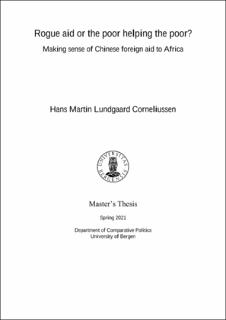Rogue aid or the poor helping the poor? Making sense of Chinese foreign aid to Africa
Master thesis
Permanent lenke
https://hdl.handle.net/11250/2766580Utgivelsesdato
2021-07-02Metadata
Vis full innførselSamlinger
- Master theses [117]
Sammendrag
This thesis investigates Chinese foreign aid allocation to Africa between 2000 and 2014. China is an emerging donor of foreign aid and has become an alternative source of assistance for African recipient countries. Considering the characteristics and history of Chinese activity in the region, this thesis focus on answering whether Chinese foreign aid allocation is guided by self-interest. Through conventional perspectives on foreign aid, the aim is to scrutinize Chinese aid allocation through traditionally expected donor motivations: Recipient need, recipient merit, and donor country self-interest. China seems to have an interest in cultivating recipient countries with oil endowments, and there are reasons to expect China select oil rich recipients with weak institutional capacity that are easier to influence. Using data on Chinese foreign aid flows from Dreher et al. (2017) , the thesis employs a two-step regression analysis to uncover whether Chinese foreign aid allocation is guided by self-interest. In addition, the same regression models will be tested on foreign flows of the Development Assistance Committee (DAC) and the United States to compare the results of Chinese foreign aid. This empirical analysis finds that Chinese aid allocation is partly guided by self-interest with a positive association to several proxies of recipient country oil abundance. Recipient merit through Taiwan recognition is also decisive for receiving Chinese aid, but not for how much in monetary amounts allocated. No association between Chinese foreign aid and oil producing recipient’s institutional quality is found. However, this thesis does find an association between a decrease in US foreign aid and oil producing recipients having strong institutional quality.
